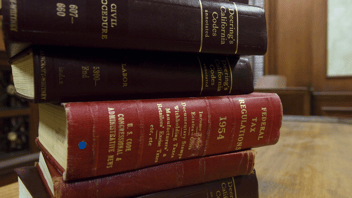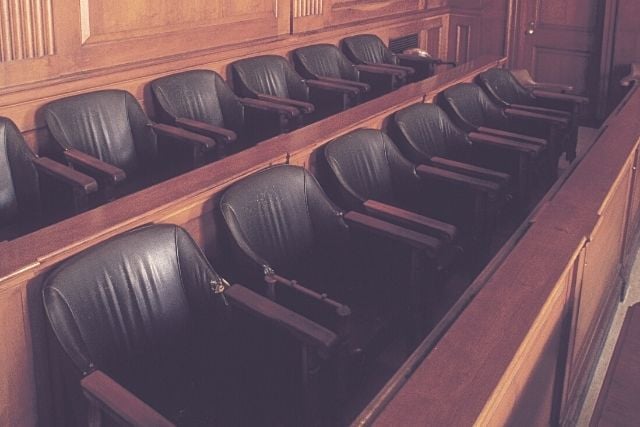
6 minute read
How to Prepare Your Case and Win Your Trial With Focus Groups
Understanding how your jurors think about your case and react to your arguments is like getting a copy of a test before you have to take it — a huge advantage for any lawyer preparing for trial.
There are two ways to understand your jurors’ decision-making process: mock testing and focus groups.
A traditional focus group allows you to peek into your jurors’ brains without the lawyer needing to present anything. A curated group of individuals, guided by a trained jury consultant as a neutral moderator, discuss the facts, issues, and arguments of your case and gather your jurors’ reactions, feedback, and critical questions.
Focus groups help identify and explore how non-lawyers will judge a case and the unique things they find important, including information they feel they need to know that may be off your radar. Focus groups are most commonly used in the litigation process before filing a case, during discovery, or right before trial.
The benefits of a traditional focus group come early in the litigation process. The lawyer can identify what’s meaningful and persuasive to jurors, what doesn’t matter, and how to present case details and arguments.
In a mock trial, a panel of mock jurors hears dueling arguments from the plaintiff and defense, first individually and then as a group. This simulation of the courtroom experience allows counsel to practice presenting their case and helps to identify any strengths and weaknesses.
Mock jury deliberations are recorded and analyzed. A jury consultant can also administer a questionnaire, which helps to identify the most persuasive arguments in a case.
After reading this post, you will understand how focus groups can help you eliminate weaknesses in your argument, prepare your case for trial, and persuade the jury to reach a verdict in your favor.
Win More Cases With Focus Groups
There is no such thing as a slam-dunk case, and in some instances, emotions can cloud judgment. Focus groups are always helpful to help determine the value of investing in the full pursuit of a case or settling out of court.
Focus groups and mock trials can be conducted remotely or in person based on your preference. The makeup of the group participants is carefully selected to mimic the demographic makeup of a sample jury in the city and state where the case is filed.
Jury consultants like myself also handle every logistical aspect of the process, including:
- Scheduling
- Location procurement and set up
- Jury identification and handling
- Questionnaire design, administration, and reporting
At virtually any point in the litigation process, a focus group can be an asset. They provide a massive dose of reality to clients, co-counsel, and other invested parties.
Identifying Strong Arguments in Discovery
Before filing a claim, a focus group can determine the most substantial arguments and the best approach for you to take.
In discovery, focus groups help save your time and money. Identifying suitable themes, evidence, and witnesses can be the difference between winning and losing.
With insight into how a jury might interpret a case, it's easier to invest in building your credibility.
The more trials and mock jury deliberations I observe, and the more actual jurors I interview after trial, I’ve come to realize that winning the battle of credibility is an essential part of winning over your jurors.
When your jurors don’t trust you and your case, all the facts and expert witnesses in the world won’t convince them otherwise.
Great facts and great witnesses don’t build credibility for you; you have to create that trust early on in the trial, or your jurors won’t trust those great facts by the time you finally present them.
In your next trial, think about your case, not in terms of the evidence, but in terms of the arguments involved. Think about the types of experiences and attitudes that would predispose a person to find your account more likely than the opposing counsel’s.
Suppose a juror goes into trial believing that doctors are honest, benevolent, and competent. In that case, that juror will almost certainly justify evidence of malpractice in a manner favorable for the doctor.
To the juror, it is more likely that the evidence was manufactured, taken out of context, has a reasonable explanation, or is the result of an honest mistake than convincing evidence of malpractice.
If your case settles out of court, focus groups are also a great tool to narrow in on the perceived value of a case and aid in determining an appropriate settlement size.
.jpg?width=640&name=dylan-gillis-KdeqA3aTnBY-unsplash%20(1).jpg)
Preparing Your Case for Trial
Once a case is going to trial, practicing with a jury in a mock trial can also be beneficial. This tactic is helpful a few weeks or months before trial to determine how an argument will be received. It can also aid in the identification of potential landmines to avoid.
Facts don’t win trials and don’t speak for themselves. How a good lawyer presents those facts, builds credibility, and explains why a verdict in their favor is fair is what truly persuades jurors.
Powerful trial themes that your jurors can relate to their own lives and beliefs are crucial to helping jurors get behind a verdict emotionally.
Facts are what jurors use to support whatever verdict they’d like to give, but they’re often persuaded by little things too, not just the big trial themes.
Your client’s dress and physical reactions matter to jurors. How polite you are with the witnesses and how courteous they are to you matters to jurors.
I could go on for pages listing little things that matter, but the most critical persuasion tactic is often your choice of words. Using the right or wrong words can make a huge difference.
A focus group or mock jury can help you identify words and phrases that mean very different things to lawyers than they do to regular people.
Understanding Your Ideal Juror
If you’re still relying on demographics, even a little bit, stop and dig deeper during jury selection. In my years of researching juries and analyzing mock trials and focus groups, demographics have never come up as significant factors.
That’s not to say that demographics aren’t sometimes predictive.
In some cases, there are differences between demographic groups. Perhaps 70% of women and 25% of men are pro-plaintiff in a particular case. But each time, there is an underlying reason why men and women view your case differently, and that reason is not related to gender itself.
The less you rely on assumptions, and the deeper your questions delve into your jurors’ values and beliefs, the better your jury selection will likely be.
Demographics are only the first layer, so take full advantage of the opportunity to ask jurors about their experiences, values, and beliefs.
If you ever find that demographics are an important variable, you didn’t ask your jurors the right questions. Focus groups can help you avoid this common pitfall.

3 Important Reminders About Focus Groups
- If you win a focus group, you haven’t learned anything. Never try to win a mock trial with a focus group. Instead, use the opportunity to determine how the jury responds to every detail of your case, especially unfavorable responses.
- If you don’t see any weaknesses in your case, you’re missing them. No one can predict the outcome of a case, but you leave a lot less up to chance with focus groups. The most robust case can be lost at trial if it doesn’t appeal to the logic and emotion of the jury. If you don’t identify the landmines before trial, you’re going to step on them.
- Cost should never hold you back. Many plaintiff’s attorneys who work on a contingency basis avoid using focus groups solely because of the initial investment. Find an agency that empowers you to conduct focus groups and mock trials on a deferred payment basis.
Cost considerations shouldn’t stop you from using this strategic tactic to give your client the best chance at winning, which is why I’m partnering with Steno to bring you Steno Focus Groups.
With their signature deferred payment process DelayPay, no payment is due until your case is closed. Contact Steno today to schedule your next focus group with us.
Get the latest from The Brief directly in your inbox
Harry Plotkin is a nationally renowned jury consultant and leading voice in jury decision-making, psychology, and persuasion. Since 2001, he has helped shape the outcome of more than one thousand trials in California and across the country. He owns and operates Your Next Jury Trial Consultants and is the facilitator of Steno Focus Groups.
AVAILABLE NATIONWIDE
The court reporting you need. The service you deserve.

Recommended for you:

.jpg?width=352&name=kelly-sikkema-1YeQl23dvJI-unsplash%20(1).jpg)
Why Juror Bias Is As Important As Your Evidence
One of the most common and fatal miscalculations made in trial strategy is relying heavily on the...
Read Blog Post





.png)


-1.png)